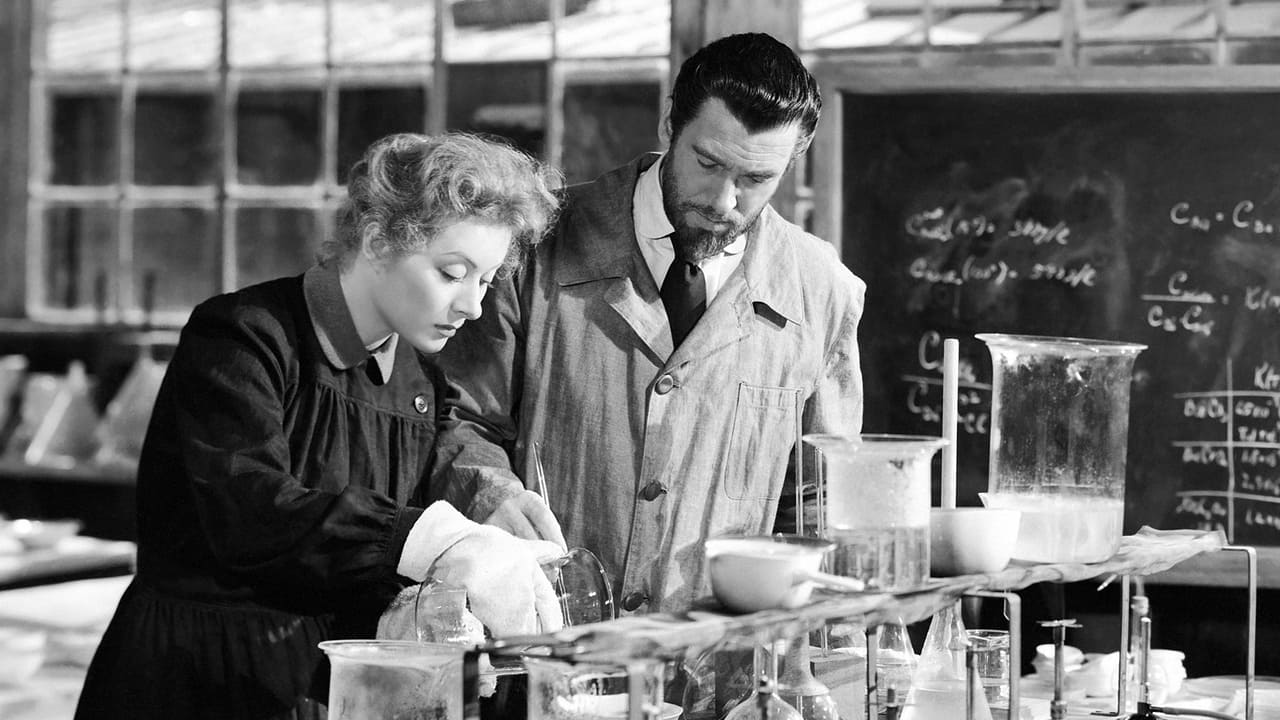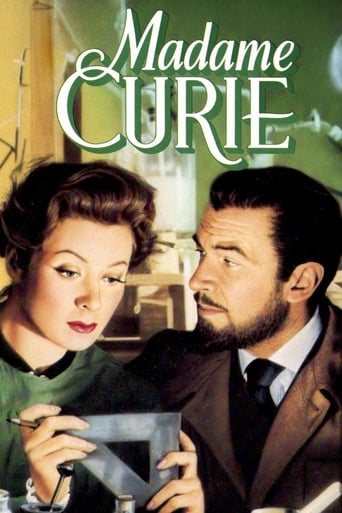Limerculer
A waste of 90 minutes of my life
HottWwjdIam
There is just so much movie here. For some it may be too much. But in the same secretly sarcastic way most telemarketers say the phrase, the title of this one is particularly apt.
ActuallyGlimmer
The best films of this genre always show a path and provide a takeaway for being a better person.
Usamah Harvey
The film's masterful storytelling did its job. The message was clear. No need to overdo.
utgard14
Fine old Hollywood biopic starring the queen of biopics, Greer Garson. Greer plays Marie Curie and her frequent costar Walter Pidgeon plays her husband Pierre. It goes without saying these two have perfect chemistry (no pun intended) and both give excellent performances. The supporting cast is terrific. Henry Travers and Dame May Witty play Pierre's parents and pretty much steal every scene they're in. Robert Walker is Pierre's assistant. His reaction upon first setting eyes on lovely Greer Garson is priceless. Vets Albert Bassermann, C. Aubrey Smith, and Reginald Owen are among the other great actors in the cast. Van Johnson has a small role as a reporter.They don't make biopics like this anymore. If they made it today there would be much more focus on tragedy and scandal rather than the inspirational. You should definitely check this one out, even if you have no knowledge of the Curies. It's a good movie made with the elegant touch one expects from classic MGM.
pmknotts
I'm the first to admit I knew little about Marie Curie until watching "Madame Curie" on Turner Movie Classics today. I knew she was a renowned French scientist long before women were accepted in such fields.Madame Curie--as a historical drama--succeeds in telling her incredible and painstaking contributions to science in the discovery of Radium. The story never lulls, not even for one minute. This film succeeds in providing a unique perspective of the sacrifice and dedication great scientists of all generations have put forth for the betterment of all mankind. Perhaps more surprising to me was how this movie moved me to tears due to the artful portrayal of Madame Curie by Greer Garson. She was truly a great actress and the chemistry she shared with Walter Pidgeon (movie after movie) just does not happen on screen often. I really thought I would be bored to tears. Instead, my tears resulted from a compelling story and equally compelling performances--especially from Ms. Garson.
Robert J. Maxwell
Greer Garson is Marie Curie from Poland, a brilliant student of physics at the Sorbonne. Her professor, Walter Pidgeon, falls for her and vice versa. Together -- through thick and thin, so to speak -- they pursue the elusive, dangerous element of radium, finally with success. They are a happy couple, Pierre and Marie. They lead irenic lives. They never have arguments like the rest of us. They're joined at the hip by their shared obsession with radioactivity. They have two lovely children too, one of them being Margaret O'Brien. Just as their life seemed most fulfilling, their joy serene, their rapture divine -- little did they know that tragedy lay just around the corner. Walter Pidgeon gets run over by a horse-drawn cart full of wine barrels. Suffering in silence, despite the comfort offered her by her older mentors and her loving family, Greer Garson finally pulls herself together and goes on to win the Nobel Prize and the film ends with the stalwart gray-haired woman giving a speech in Stockholm.Boy, is she noble. The movie is divided about fifty-fifty into the story of the search for radium and her family life. Both of these life spaces are studded with failures of one sort or another but Garson sets her considerable jaw and looks fearlessly ahead.I frankly don't know what all that family stuff is doing in there. It could have been sketched in with more brevity. Walter Pidgeon is hardly more than an ancillary character, in the movie only to provide the heroine with a love interest and a climactic tragedy. Here's how they work together in their research. Something like this. Garson: "Suppose the radium did NOT disappear. What if the living element itself were in the stain at the bottom of the bowl? Suppose the energy could be used to destroy unhealthy tissue as well as healthy?" Pidgeon (excited): "Yes -- go on!" There was a BBC production of "The Double Helix" back in the 80s that managed to make scientific research exhilarating without debasing it with factitious triumphs, tragedies, and emotional epiphanies. I don't know how much of this movie is made up. I suppose it sticks roughly to the historical facts in its broad outline. We can certainly believe, for instance, that Marie and Pierre Curie were married and that they had children and that they discovered radium and that she won a Nobel Prize. (She won two, I believe, in physics and in chemistry, but I'm too lazy to look it up.) The conversations -- both the intimate ones between the married couple and the more public ones involving their families -- are concocted, but probably not more than most run-of-the-mill studio productions of the period. This particular example comes from MGM. Some of the best came from Warner Brothers.One of the film's virtues is the way that the research process is spelled out. It's explained in a way that the alphabet is explained to kindergärtners, and that's fine with me. I was really fascinated when they measure the radioactivity of thorium and uranium and realize that there must be a powerful third element in the batch. I wish they had gone into it in more detail, and skipped the cute stuff involving the irascible father of Walter Pidgeon. We never do find out what radioactivity is. No one at the time knew anything about the dangers of radiation poisoning. Marie Curie may have died of its effects. Wilhelm Roentgen, who discovered X-rays, probably killed his own wife by unwitting overexposure during the same period.Another admirable feature of the film is the attention it brings to the discrimination against women that was so common at the time. And it accomplishes this without being strident. It's mentioned a few times, notably by Pidgeon, but it doesn't sound as if his objections are written for an audience of feminists, probably because such an audience, to the extent that it existed in 1942, was to the general audience what radium was to pitchblend, an almost infinitesimal fraction of a fraction.Anyway the movie does what it set out to do. It introduces us to a couple of courageous scientific geniuses, their professional achievements and their family lives. The stuff on the family, which I've derided, was a specialty of the MGM house.
Mike-764
The story of Marie Curie who at the beginning of the film is a Polish student at the Sorbonne who is given the opportunity for working with Dr. Pierre Curie on his experiments when the two learn of a fellow professor who has found a rock that seems to give off its own light and energy despite being deep underground for centuries. The two find that it must contain a new element, more radioactive that uranium. The two are able to isolate the new element despite the hardships of inadequate lab equipment, the birth of a young daughter, their colleagues questioning their work, and numerous failed experiments. Excellent film dealing with the hard work of the Curies and the realization that hard work and commitment will pay off (nice ideal during the war years). Garson and Pidgeon build on the great chemistry the two had in Mrs. Miniver, and are helped by an excellent supporting cast. The screenplay and LeRoy's direction do each other perfect justice by combining the romance and drama superbly. Rating, 8.

